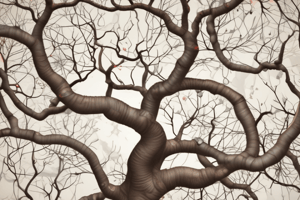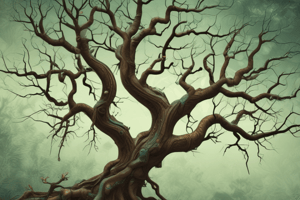Podcast
Questions and Answers
What is the study of plants, including their structure, growth, evolution, and classification?
What is the study of plants, including their structure, growth, evolution, and classification?
- Ecology
- Botany (correct)
- Zoology
- Microbiology
What is the level of organization that consists of two or more types of tissues performing a specific function?
What is the level of organization that consists of two or more types of tissues performing a specific function?
- Organ (correct)
- Organ System
- Tissue
- Cell
What is the type of molecule that contains genetic information?
What is the type of molecule that contains genetic information?
- Lipids
- Proteins
- Carbohydrates
- Nucleic Acids (correct)
What is the organelle responsible for generating energy for the cell?
What is the organelle responsible for generating energy for the cell?
What is the process by which cells generate energy from glucose?
What is the process by which cells generate energy from glucose?
What is the study of chemical processes within living organisms?
What is the study of chemical processes within living organisms?
What is the level of organization that consists of a group of organisms of the same species living in a specific area?
What is the level of organization that consists of a group of organisms of the same species living in a specific area?
What is the process of cell division resulting in four daughter cells with half the number of chromosomes as the parent cell?
What is the process of cell division resulting in four daughter cells with half the number of chromosomes as the parent cell?
Flashcards are hidden until you start studying
Study Notes
Branches of Biology
- Botany: study of plants, including their structure, growth, evolution, and classification
- Zoology: study of animals, including their structure, growth, evolution, and classification
- Microbiology: study of microorganisms, such as bacteria, viruses, and fungi
- Ecology: study of interactions between organisms and their environment
- Genetics: study of heredity, genes, and genetic variation
- Biochemistry: study of chemical processes within living organisms
- Biophysics: study of physical principles underlying biological processes
- Molecular Biology: study of biological molecules, such as DNA, proteins, and cells
Levels of Organization
- Molecule: basic building blocks of life, such as carbohydrates, proteins, and nucleic acids
- Cell: basic structural and functional unit of life
- Tissue: group of similar cells performing a specific function
- Organ: structure composed of two or more types of tissues performing a specific function
- Organ System: group of organs working together to perform a specific function
- Organism: individual living thing, such as an animal, plant, or microbe
- Population: group of organisms of the same species living in a specific area
- Community: group of different species living in a specific area
- Ecosystem: community of organisms and their physical environment
Biological Molecules
- Carbohydrates: energy-rich molecules, such as sugars and starches
- Proteins: molecules composed of amino acids, performing various functions in the body
- Nucleic Acids: molecules containing genetic information, such as DNA and RNA
- Lipids: molecules that do not dissolve in water, such as fats and oils
Cell Structure and Function
- Cell Membrane: thin layer of lipid and protein molecules surrounding the cell
- Cytoplasm: jelly-like substance inside the cell membrane, where metabolic processes occur
- Nucleus: membrane-bound organelle containing genetic material
- Mitochondria: organelles responsible for generating energy for the cell
- Endoplasmic Reticulum: network of membranous tubules and sacs involved in protein synthesis and transport
- Ribosomes: small organelles responsible for protein synthesis
Cellular Processes
- Photosynthesis: process by which plants convert light energy into chemical energy
- Cellular Respiration: process by which cells generate energy from glucose
- Mitosis: process of cell division resulting in two daughter cells with the same number of chromosomes as the parent cell
- Meiosis: process of cell division resulting in four daughter cells with half the number of chromosomes as the parent cell
Branches of Biology
- Botany involves the study of plant structure, growth, evolution, and classification.
- Zoology involves the study of animal structure, growth, evolution, and classification.
- Microbiology involves the study of microorganisms such as bacteria, viruses, and fungi.
- Ecology involves the study of interactions between organisms and their environment.
- Genetics involves the study of heredity, genes, and genetic variation.
- Biochemistry involves the study of chemical processes within living organisms.
- Biophysics involves the study of physical principles underlying biological processes.
- Molecular Biology involves the study of biological molecules such as DNA, proteins, and cells.
Levels of Organization
- Molecules are the basic building blocks of life, including carbohydrates, proteins, and nucleic acids.
- Cells are the basic structural and functional units of life.
- Tissues are groups of similar cells performing a specific function.
- Organs are structures composed of two or more types of tissues performing a specific function.
- Organ Systems are groups of organs working together to perform a specific function.
- Organisms are individual living things, such as animals, plants, or microbes.
- Populations are groups of organisms of the same species living in a specific area.
- Communities are groups of different species living in a specific area.
- Ecosystems are communities of organisms and their physical environment.
Biological Molecules
- Carbohydrates are energy-rich molecules, including sugars and starches.
- Proteins are molecules composed of amino acids, performing various functions in the body.
- Nucleic Acids are molecules containing genetic information, including DNA and RNA.
- Lipids are molecules that do not dissolve in water, including fats and oils.
Cell Structure and Function
- The Cell Membrane is a thin layer of lipid and protein molecules surrounding the cell.
- Cytoplasm is a jelly-like substance inside the cell membrane, where metabolic processes occur.
- The Nucleus is a membrane-bound organelle containing genetic material.
- Mitochondria are organelles responsible for generating energy for the cell.
- The Endoplasmic Reticulum is a network of membranous tubules and sacs involved in protein synthesis and transport.
- Ribosomes are small organelles responsible for protein synthesis.
Cellular Processes
- Photosynthesis is the process by which plants convert light energy into chemical energy.
- Cellular Respiration is the process by which cells generate energy from glucose.
- Mitosis is the process of cell division resulting in two daughter cells with the same number of chromosomes as the parent cell.
- Meiosis is the process of cell division resulting in four daughter cells with half the number of chromosomes as the parent cell.
Studying That Suits You
Use AI to generate personalized quizzes and flashcards to suit your learning preferences.




